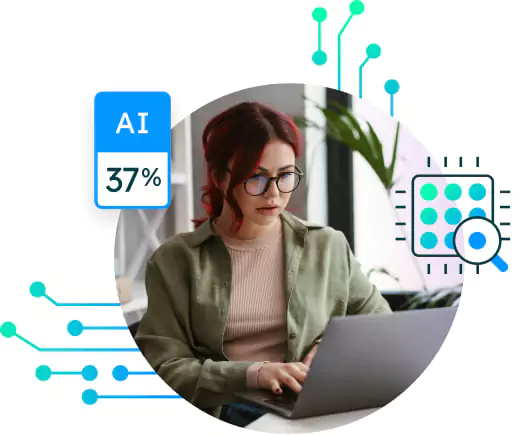As OpenAI’s GPT-4 and similar sophisticated AI text generators make headway, they pose fresh challenges in academia, particularly for maintaining academic integrity. The emergence of AI-generated texts intensifies the demand for effective countermeasures to detect and combat potential academic dishonesty. Before, students would consult college paper writing service reviews or homework help websites to go about difficult assignments. There, learners received human support as opposed to the popular technology – AI. Responding to this call, leading plagiarism detection service Turnitin is launching new tools, illustrating how the academic community can evolve to keep pace with these technological advancements.

✅ AI Essay Writer ✅ AI Detector ✅ Plagchecker ✅ Paraphraser
✅ Summarizer ✅ Citation Generator
Key Takeaways:
- AI-generated content is increasing the workload of educators, making it harder to detect academic dishonesty.
- AI-generated content is increasing the workload of educators, making it harder to detect academic dishonesty.
- Collaboration among various stakeholders – AI developers, plagiarism detection services, and educational institutions – is pivotal to address the challenges posed by AI advancements.
A Rising Challenge for Academic Integrity
Turnitin, a leading plagiarism detection service, is launching a new tool to tackle the challenges posed by OpenAI’s GPT-4, an AI text generator that creates human-like, coherent text. The launch comes amid growing concerns among educators that GPT-4 could make it increasingly difficult for plagiarism detection services to identify academic misconduct.
According to the Financial Times article, over 70% of the 14,000 US and UK teachers surveyed in a recent study found that AI-generated content had increased their workload, as they struggled to identify instances of academic dishonesty. The study also highlighted that 62% of teachers believe AI-generated content will make it harder to detect plagiarism in the future.
Navigating the Global Economic Landscape: Insights and Trends
In the ever-evolving global economic landscape, staying informed and adaptable is key. As AI technology like OpenAI’s GPT-4 plays a progressively significant role, it affects sectors beyond tech, including academia, challenging traditional norms. This tech infusion is leading to increased workload for educators, and posing new hurdles in maintaining academic integrity, as it becomes harder to look out for AI-generated content even with the best free AI detector by your side.

Responding to these shifts, tools like the new one launched by Turnitin, a plagiarism detection service, are using advanced algorithms to identify AI-generated content, balancing tech advancement with academic honesty. Moving forward, collaboration among AI developers, plagiarism detection services, and educational institutions is essential to navigate this landscape. It’s not just about tech adaptation; fostering a culture of academic integrity and ethical AI usage is equally crucial. The future will involve not only understanding and leveraging AI’s growing capabilities but also tackling the ethical challenges and academic implications arising from its use.
Advancements in Plagiarism Detection Tools: Adapt or Perish
The new tool launched by Turnitin will employ advanced algorithms and machine learning techniques to identify AI-generated content, helping maintain academic integrity in the face of rapidly evolving AI technology. Turnitin’s announcement has sparked debates about the future of plagiarism detection and the ethical use of AI in academia.
One reader’s comment emphasized the need for plagiarism detection services like Turnitin to adapt to the rapid advancements in AI technology. They suggested that investing in research and development to create more sophisticated detection methods is essential for staying ahead of AI-generated content.
Another comment highlighted the ethical dilemma surrounding AI-generated texts, calling for a broader conversation on the responsible use of AI in education. The commenter urged schools and universities to engage in discussions about the ethical implications of using AI-generated content and to establish guidelines for its appropriate use.
A third reader pointed out that the onus should not solely be on plagiarism detection services to identify AI-generated content. They argued that educators should also play an active role in fostering a culture of academic integrity and discouraging the use of AI-generated texts for unethical purposes.

In response to these concerns, some commenters proposed implementing more rigorous checks in the grading process, including requiring students to submit drafts and demonstrate their thought process. This approach could help educators identify inconsistencies that may indicate the use of AI-generated content.
As AI technology continues to advance and its capabilities expand, maintaining academic integrity will become an increasingly complex challenge. Turnitin’s new tool is a crucial step towards addressing the ethical implications and challenges posed by AI-generated content. However, ongoing collaboration between AI developers, plagiarism detection services, and educational institutions remains essential to tackling the evolving landscape of academic misconduct.
Future of Academic Integrity Amid AI Advancements
As AI technology continues to advance and its capabilities expand, maintaining academic integrity will become an increasingly complex challenge. Turnitin’s new tool is a crucial step towards addressing the ethical implications and challenges posed by AI-generated content. However, ongoing collaboration between AI developers, plagiarism detection services, and educational institutions remains essential to tackling the evolving landscape of academic misconduct.
- Best assignment writing service: Our top 10 – Reserve Version
- Best assignment service: Our top 10
- Ground News Review 2025
- Media Bias Fact Check Review 2025
- PolitiFact Review 2025
Follow us on Reddit for more insights and updates.





Comments (0)
Welcome to A*Help comments!
We’re all about debate and discussion at A*Help.
We value the diverse opinions of users, so you may find points of view that you don’t agree with. And that’s cool. However, there are certain things we’re not OK with: attempts to manipulate our data in any way, for example, or the posting of discriminative, offensive, hateful, or disparaging material.